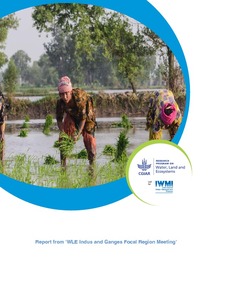Location
The International Water Management Institute (IWMI) is a non-profit, scientific research organization focusing on the sustainable use of water and land resources in developing countries. It is headquartered in Colombo, Sri Lanka, with regional offices across Asia and Africa. IWMI works in partnership with governments, civil society and the private sector to develop scalable agricultural water management solutions that have a real impact on poverty reduction, food security and ecosystem health. IWMI is a member of CGIAR, a global research partnership for a food-secure future.
IWMI’s Mission is to provide evidence-based solutions to sustainably manage water and land resources for food security, people’s livelihoods and the environment.
IWMI’s Vision, as reflected in the Strategy 2014-2018, is ‘a water-secure world’. IWMI targets water and land management challenges faced by poor communities in the developing countries, and through this contributes towards the achievement of the United Nations Millennium Development Goals (MDGs) of reducing poverty and hunger, and maintaining a sustainable environment. These are also the goals of CGIAR.
IWMI works through collaborative research with many partners in the North and South, and targets policymakers, development agencies, individual farmers and private sector organizations.
Resources
Displaying 286 - 290 of 959Proceedings of the Senior Stakeholders’ Meeting on Groundwater in the Jaffna Peninsula, Jaffna, Sri Lanka, 16 May 2013
Proceedings of the National Seminar on Groundwater Governance in Sri Lanka, Colombo, Sri Lanka, 15 August 2013
Rapid assessment of water availability and appropriate technologies for small-scale farming: guidelines for practitioners
Limited access to water is a key reason why millions of poor farmers struggle to grow enough food and marketable crops to improve their lives. Public sector agencies, civil society organizations and donors seeking to improve small-scale farmers’ access to water resources face limited data on the location and accessibility of water resources. This paper addresses this gap by providing a tested method to assess water resources that small-scale farmers can access affordably and sustainably.






